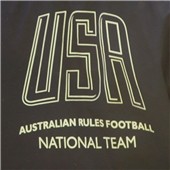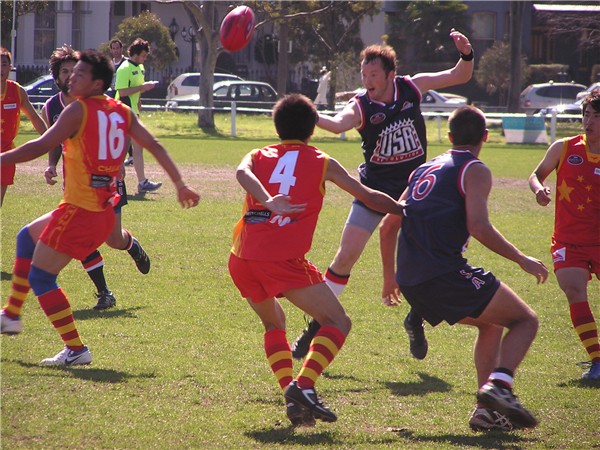Paul Duncan, returned Revo featured
- Tuesday, September 23 2008 @ 06:39 am ACST
- Contributed by: Troy Thompson
- Views: 5,131

 Paul Duncan was one of the standouts for the US Revolution team at this year's International Cup. The mobile forward played in five matches for his country in the competition kicking goals against South Africa and China and featured as best player for the US in the match against China.
Paul Duncan was one of the standouts for the US Revolution team at this year's International Cup. The mobile forward played in five matches for his country in the competition kicking goals against South Africa and China and featured as best player for the US in the match against China.
Duncan was this week featured in the Winston Salem Journal - the full article is reproduced below.
Won't hear this athlete whining for more respect
By Scott Sexton | Journal Columnist
Published: September 18, 2008
Paul Duncan didn't win a gold medal. He didn't bank a seven-figure deal to endorse a national cell-phone company, nor was he asked to be the host of Saturday Night Live. He couldn't care less.
Duncan, 23, is still riding an emotional high three weeks after flying home from the other side of the planet, where he was one of 33 players who represented the United States in the International Cup -- basically the World Cup of Australian Rules Football. "The chance to play for your country, in any sport, doesn't come along very often," Duncan said. "I'm pretty excited."
Because the competition was held at odd hours -- relative to Eastern Daylight Time -- Duncan's friends and family had to follow the team on the Internet and really long-distance phone calls. And even though the rules of the game elude most of them, that didn't dampen their enthusiasm for Duncan's accomplishment in making a national team. "I'm very proud of him," said his father, Dave Duncan, a cardiac surgeon from Winston-Salem. "He's very fortunate that he found something he loves and gets to travel the world and meet some really great people as a result. "I wish I had his life."
‘Pretty cool game'
A Mount Tabor graduate who is now an engineer in Atlanta, Duncan got involved with Australian Rules Football when he was a student at N.C. State. In 2005, he spent a semester at the University of Wollongong in New South Wales and got to see the Australian Football League's Grand Final, the Super Bowl of Aussie Rules. If you're scoring at home, the Sydney Swans beat the West Coast Eagles in a thriller. "I thought this is a pretty cool game and I should learn more about it," Duncan said. Still, none of us would have ever heard of him if family friend Jeff Teeter hadn't e-mailed a tip. "We all kind of laughed a few years ago when he said he wanted to start a team in Raleigh," Teeter said. "Truthfully, we never would have guessed that there were teams here." But after reading about local cricket players a few weeks ago, Teeter figured that people might want to know about a hometown kid who went international, even if it was in a sport that only the most hard-core sports junkies know about because it was a staple on ESPN in the '80s.
"You know the old joke about how they pick the team?" Teeter asked. "They line all the guys up and throw bricks at their heads. The ones that don't duck make the team." Not quite. More than 90 players from 40 teams across the United States tried out. Thirty-five were selected, and 33 made the trip Down Under. But there is a grain of truth in that it's not a game for the timid or the weak. Put another way, Aussie Rules it is a full-contact sport in which a clothesline tackle is a perfectly acceptable method of knocking a player down. "It can be a little rough," Duncan said in a giant understatement. "But the good thing is they like their beer afterward."
The right reasons
If you are thinking, "What's the big deal? The International Cup sounds a lot like Canada playing host to a hockey tourney and only inviting teams from Asia," you're missing the point. (For the record, 16 teams -- South Africa, Denmark, China and New Zealand to name a few others -- participated. Australia did not, as they would dominate the competition. Papua New Guinea won, and the United States placed seventh.) Rather, the story of Duncan's involvement with the national team is one of a kid who plays a truly amateur sport for the right reasons.
He plays because he loves the game and enjoys the competition and the camaraderie. And he is willing to dig deep into his own pocket to participate. National-team players shelled out about $3,000 each just for just the privilege of wearing the red, white and blue overseas. Remember that the next time you hear about an overpaid professional athlete whining about respect. "I'm going to play for as long as I can," Duncan said. "I hope I can play until I'm 40."
Duncan (6) below in Action against China



 RSS news
RSS news Twitter
Twitter Facebook
Facebook